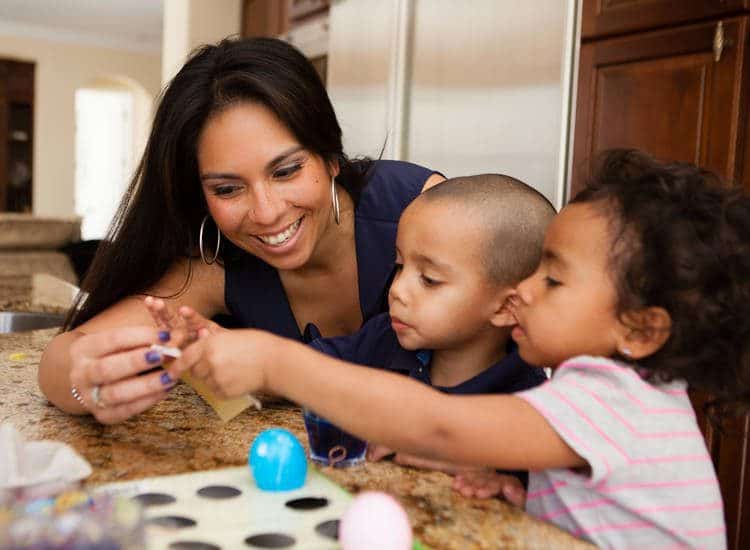School readiness, used here to mean strong academic performance and a successful social adjustment to school, is strongly influenced by a child’s specific culture.
School readiness, used here to mean strong academic performance and a successful social adjustment to school, is strongly influenced by a specific child’s specific culture. The word “culture” conjures up many meanings. Here we use it to refer to the shared implicit and explicit rules and traditions (expressed through the beliefs, values and goals) of a group of people (Kalyanpur and Harry, 1999). Culture is a context within which all of our learning takes place, during the first three years and throughout our lives.
Cultural identity is shaped by a family’s national or ethnic background, and includes much more, as well. Culturally based values, assumptions, and beliefs are formed through the experiences people have with school, community, professional, and social groups. Each family has its own culture that reflects its shared history, experiences and beliefs. For this reason, beliefs about discipline, the value of school, and appropriate behavior, for example, may vary dramatically even within families from the same ethnic, national or racial backgrounds. A supportive, nurturing family relationship that permits each individual to develop to their fullest potential is the most important protective factor for the healthy development of very young children. These familial relationships provide children with the solid social-emotional grounding they need to approach school with confidence, optimism, and a joy for learning. Such relationships exist within the context of a family, community, and societal culture.
For program leaders and their staff, working with diverse families and colleagues to promote young children’s school readiness raises challenges. Staff members may discover culturally-based differences among themselves related to issues of school readiness. These differences can serve to enrich the program’s services if they are recognized, negotiated, and addressed. No one person can expect to know all about every culture’s values, beliefs and assumptions about child-rearing and school readiness for young children. However, we all can learn to recognize and share our own culturally-based beliefs and attitudes, to listen carefully to others, and to work together to negotiate differences when necessary. Young children and their families—as well as staff and colleagues—benefit when their cultures are honored, respected, and included into the program’s delivery of services.
Learning more about the culture and communities of the families you serve provides both leaders and staff with crucial knowledge necessary to support the school readiness goals of very young children. The tips listed below offer some initial suggestions for how to begin this learning process.
Promoting School Readiness by Understanding Family, Culture and Community
1. Help staff understand, perhaps through supervisory discussions or group trainings, what they bring to the work.
Like the families they serve, staff perceive the world from the standpoint of their individual beliefs, expectations, and assumptions. How does staff’s cultural, familial and community experiences influence their interactions with children and parents?
2. Realize that one’s field provides another cultural lens that influences how we understand a family’s particular situation.
For example, for the same child, an occupational therapist might be most concerned with the fact that he can’t sit up on his own, while his mental health therapist may be most concerned that he bites when he’s frustrated. Ask staff to think about how their field, their work experience and their education has influenced their beliefs about children’s development and readiness for school.
3. Ensure that all staff, but especially new members to the team, are familiar with the community your program serves.
All new staff should receive a tour of the area, preferably with a member of the community. Where do people live, children play, families worship? Where is the grocery store? Where is the closest library? What does the community “feel” like?
4. Make parent perspectives an integral part of your program’s structure; ideas include:
- establishing a parent Board position;
- asking for parent input in identifying appropriate activities, field trips, ways to celebrate in your program;
- involving parents in your program’s advisory committee;
- inviting parents to participate in interviews of new staff;
- soliciting parent feedback on the program’s services through surveys or other means (for example, one-on-one interviews);
- taking on the role of community leader by advocating for community needs at the local government level.
5. With staff, develop effective ways of explaining to parents the impact the first three years have on school readiness.
Often this can be done by helping staff to “translate” their observations of families in ways that highlight the important learning that takes place in everyday interactions. For example, the give-and-take of a baby babbling and her mother copying her sounds teaches children about turn-taking and communication and, from a social-emotional perspective, teaches children that they are important, loved, and listened to.
Resources:
Kalyanpur, M., & Harry, B. (1999). Culture in special education: Building reciprocal family-professional relationships. Baltimore: Paul H. Brookes Publishing Co..
Barbarin, O. A. “Culture and Ethnicity in Social, Emotional and Academic Development” in Set for Success: Building a Strong Foundation for School Readiness Based on the Social-Emotional Development of Young Children. 2002: The Ewing Marion Kaufman Foundation, Kansas City.




